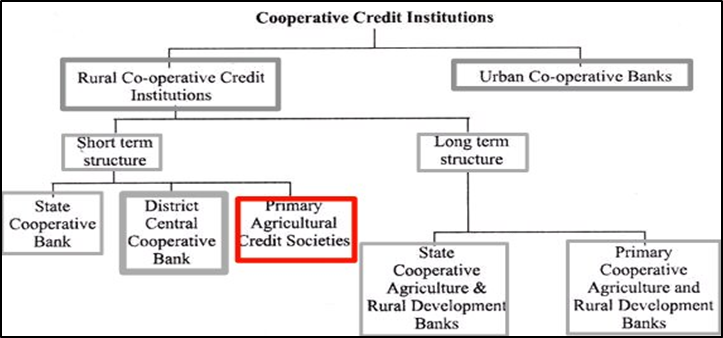In News:
- Recently, the Cabinet Committee on Economic Affairs chaired by the Prime Minister has approved Computerization of Primary Agricultural Credit Societies (PACS).
- This project proposes computerization of about 63,000 functional PACS over a period of 5 years with a total budget outlay of Rs. 2516 crore.
What’s in today’s article:
- Overview of co-operative credit system in India
- Primary Agricultural Credit Societies (PACS)
- News Summary
Overview of co-operative credit system in India:

- The rural co-operative credit system in India is primarily mandated to ensure flow of credit to the agriculture sector.
- It comprises short-term and long-term co-operative credit structures.
- The short-term co-operative credit structure operates with a three-tier system -
- Primary Agricultural Credit Societies (PACS) at the village level.
- Central Cooperative Banks (CCBs) at the district level and
- State Cooperative Banks (StCBs) at the State level.
- StCBs/DCCBs are registered under the provisions of State Cooperative Societies Act of the State concerned and are regulated by the RBI.
Primary Agricultural Credit Societies (PACS):
- The PACS constitute the lowest tier of the three-tier Short-term cooperative credit in the country comprising 13 cr. farmers as its members, which is crucial for the development of the rural economy.
- PACS account for 41 % (3.01 cr. farmers) of the Kisan Credit Card (KCC) loans.
- 95 % of these KCC loans (2.95 Cr. farmers) are to the Small and Marginal farmers.
- PACS are outside the purview of the Banking Regulation Act, 1949 and hence not regulated by the RBI.
Objectives
- To provide short and medium-term loans only to its members, the repayment schedule of which can be decided on the basis of the purpose and tenure for which the members take the loan.
Role:
- Its main role is to deal with agricultural borrowers of the village by giving agricultural, short-term and medium-term purpose loans to the borrowers then collecting the repayments against those loans.
- They act as a link between the country’s higher financial agencies and the ultimate borrowers.
Features:
- PACS are the association of farmers, which confers an equal level of rights on all members of society without considering their holding of share and their social standing.
- Share of the societies is of small value so that poor farmers can also become its members.
- Its area of operation is limited to the village (to which it belongs) and its membership should be given only to those located at the village where the credit society is established.
Functions:
- Borrowing an adequate amount of funds from central financial agencies in order to help its members in a timely manner.
- To make the arrangement of supplying the agricultural inputs including seeds, fertilizers, insecticides, etc.
- Maintaining the supply of the light machinery for the agricultural purpose.
- It helps its members by providing marketing facilities that could enhance the sale of their agricultural products in the market at the proper prices.
Advantages:
- It helps the farmers to get credit for agricultural purpose and government-related funds distribution to eligible farmers at their place.
- It helps in promoting savings habits among its members.
- It helps in implementing any government schemes which are related to farmers at their level and also to observe whether these schemes are attaining their intended purpose or not.
Challenges:
- Organizational weakness: Though PACS covers the major portion of the villages, still villages in the northeastern states are not covered.
- Over dues: The larger overdues come from landowners rather than small cultivators, implying that a few farmers who are relatively stronger in the village took unfair advantage of these PACS.
- Lack of resources: The PACS's resources are far too limited in relation to the rural economy's short- and medium-term credit needs. This is largely due to insufficient funds provided by higher-level funding agencies.
News Summary:
- The Cabinet Committee on Economic Affairs (CCEA) has approved computerization of 63,000 functional Primary Agricultural Credit Societies (PACS) over 5 years.
Benefits
- Efficiency in working and building trust
- The majority of PACS have so far been not computerized and still functioning manually resulting in inefficiency and trust deficit.
- In some of the states, stand-alone and partial computerization of PACS has been done.
- Hence, this step will increase the efficiency of PACS, bringing transparency and accountability in their operations.
- It will facilitate PACS to diversify their business and undertake multiple activities or services.
- Bringing uniformity and developing inter-connections
- There is no uniformity in the software being used by them and they are not interconnected with the DCCBs and StCBs.
- Hence, it has been proposed by the Ministry of Cooperation:
- To computerize all the PACS throughout the Country and bring them on a common platform at National level and
- Have a Common Accounting System (CAS) for their day-to-day business.
- Financial inclusion & strengthening of service delivery to farmers
- Computerization of PACS will serve the purpose of financial inclusion especially of Small & Marginal Farmers (SMFs).
- It will also lead to strengthening of service delivery to farmers.
- With computerization, PACS shall become nodal service delivery point for various services and provision of inputs like fertilizers, seeds etc.










